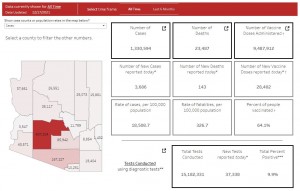 In a public health emergency, as with any other battle, it’s critical to have the best, most accurate information.
In a public health emergency, as with any other battle, it’s critical to have the best, most accurate information.
That’s why ADHS has invested considerable staff time and resources during the pandemic to gathering, synthesizing, and presenting data critical to understanding what COVID-19 is up to.
Having this data allows public health professionals, healthcare providers, and the public to know exactly how COVID-19 is affecting hospital capacity in terms of ICU beds, in-patient beds, and emergency department capacity, among other hospital-specific metrics. Age ranges and ethnicity yield telling information about COVID-19’s impact on different parts of the population. Geographic data tells us where resources may be needed such as additional testing sites or vaccination sites.
We can determine percent positivity from COVID-19 testing, a critical measure of spread, because the data includes negative tests as well as positive ones. We can know how many Arizonans have gotten vaccinated, along with demographic information that helps identify gaps so ADHS and partners can focus our messaging and outreach.
Much of the data behind the COVID-19 dashboard ADHS updates daily is available because of an Enhanced Surveillance Advisory made possible through executive order that has been in place since the start of the pandemic. This week, Governor Ducey has extended that executive order to make sure public health, health care entities, and the public know as much as possible about this invisible killer.
As with other private medical information, what is collected at the patient level to provide this essential COVID-19 information is not available to the public under state and federal law, including the Health Insurance Portability and Accountability Act (HIPAA). We take our responsibility to your privacy very seriously, not just because it’s the law but because it is the right thing to do.
Access to detailed personal information is strictly limited. Your doctor is able to check to see when you were vaccinated so they know whether or not you are eligible for a booster. You are able to request your own or your child’s vaccination information in case you need it to enroll in school or obtain a visa to a foreign country. But personal data like name, age, and address, is protected. For example, we share population level, de-identified data with our federal partners, but not patient-level data.
Based on the intense interest we see in our daily dashboard updates, many Arizonans see the value of knowing as much as possible about COVID-19. I wanted you to know how much of this information comes to ADHS, why it’s so important to the health and welfare of all Arizonans, and how we protect it.










